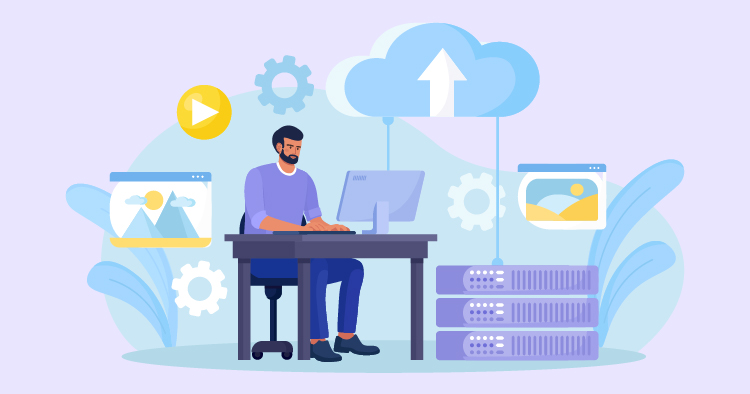Choosing the right hosting for your WordPress site is crucial for ensuring optimal performance and a smooth user experience. Fast WordPress hosting can significantly reduce page load times, improve search engine rankings, and enhance your website’s overall functionality. With many hosting options available, it’s essential to understand the features and benefits that contribute to a speedy and reliable hosting environment. This article will explore how fast WordPress hosting can transform your site’s performance and provide tips for selecting the best provider to meet your needs.
Why Fast WordPress Hosting Matters
Fast WordPress hosting is essential for keeping your visitors happy. When a website takes too long to load, people tend to get frustrated and may leave before seeing what you offer. This can increase your bounce rate – the number of visitors who leave after viewing just one page.
A quick-loading site is also suitable for businesses. It creates a smooth browsing experience that encourages visitors to stay, check out more pages, and potentially purchase or sign up for your service. Websites that load quickly are known to have better conversion rates.
Search engines, like Google, favor websites that load quickly. With a fast WordPress host, your site can perform better in search results. This is a big deal because the higher your site ranks, the more likely people will find it. So, fast hosting isn’t just about improving your site for visitors; it’s also an intelligent move for search engine optimization (SEO).
Understanding the Factors that Influence WordPress Site Speed
Your choice of web hosting is crucial for how fast your WordPress site runs. Fast WordPress hosting is designed to provide the best performance using servers specially configured for WordPress. This means your site can better handle traffic and load faster.
Your website’s design is also meaningful. The theme and plugins you choose should be known for their excellent performance. Plus, you need to optimize your content, like making sure images aren’t more significant than they need to be, which can slow down your site.
Caching and content delivery networks (CDNs) can also speed things up. Caching saves parts of your site so it doesn’t have to load from scratch whenever someone visits. CDNs store your site on servers worldwide, so it loads quickly, no matter where your visitors are. Picking the right plugins can help you speed up your site without losing any cool features you want to keep.
Choosing the Fastest WordPress Host: Factors to Consider
When searching for a WordPress host that can give you the speed you need, several vital factors should be considered. First, closely examine the server technology the hosting company uses. You’ll want to find a host that uses the latest hardware, including speedy solid-state drives (SSDs) and fine-tuned software, to make WordPress sites run quickly and smoothly.
Select one of over 500 designs and establish your online presence.
- Free Web Hosting
- Fully Managed Solutions
- Scalable Websites
- No Hidden Cost
Another important consideration is where the host’s data centers are located. The physical distance between the servers and your website visitors can influence how quickly your site loads for them. If most of your audience is in a specific region, you’ll want to choose a host with data centers nearby to ensure the fastest possible delivery of your content.
Managed WordPress hosting can be a great option if you’re looking for top performance. These services cover your technical aspects, such as automatic software updates and expert support. They also offer server setups specifically optimized for WordPress, which can help your site run more efficiently and give you a significant advantage regarding speed and overall performance.
Best Practices to Optimize WordPress for Speed
It’s essential to pick a WordPress theme designed for speed. Look for themes described as “lightweight” or “optimized for speed.” These themes have less complex code, which helps your website load faster. A clean and efficient theme can make a big difference in how quickly your website appears to visitors.
Every image, script, or style sheet on your page requires a separate HTTP request for the browser to load. If your page has too many elements, it can slow down. You can speed things up by simplifying your design and combining files. Image optimization tools like Smush or ShortPixel should also be used. These tools compress your images without losing quality, so they load faster.
Caching can significantly speed up your WordPress site. It saves a version of your site on the visitor’s device, so it loads quicker the next time they visit. Plugins like W3 Total Cache or WP Rocket can help with this. They also offer minification, which shrinks the size of your code and files. Plus, using a Content Delivery Network (CDN) like Cloudflare can speed up your site for visitors worldwide.
The Power of Content Delivery Networks (CDNs) in WordPress Hosting
CDNs make your website faster by storing copies of your site on multiple servers across the globe. When someone visits your site, they get the data from the server closest to them, which is much quicker than reaching out to where your site is hosted. It’s like having a local store in every neighborhood, so people don’t have to travel far to get what they need.
A CDN doesn’t just speed up your website. It also helps with handling high traffic and protecting against DDoS attacks. Your site becomes more reliable and provides a better experience for your visitors, leading them to spend more time on your site and less likely to leave out of frustration.
Many WordPress hosting services make using a CDN with your website easy. You can usually set one up directly from your hosting control panel. It’s often as simple as clicking a few buttons to activate the service and start speeding up your site for visitors worldwide.
Leveraging Caching to Supercharge Your WordPress Site
Caching can transform the speed and efficiency of your WordPress site. It works by storing copies of your web pages. When repeat visitors arrive, these stored pages load much quicker than if the server had to process each page from scratch every time. This reduces the strain on your server and delivers a snappier browsing experience to your audience.
Select one of over 500 designs and establish your online presence.
- Free Web Hosting
- Fully Managed Solutions
- Scalable Websites
- No Hidden Cost
Several plugins like WP Rocket and W3 Total Cache can help you implement caching on your WordPress site. These plugins offer a range of caching options, including page caching, which stores complete webpage copies, and object and browser caching, which handles specific elements of your site and the user’s browser, respectively. Each type of caching contributes to improving page loading times overall.
To start with caching, you’ll typically need to install one of these plugins and then configure it to suit your site’s specific requirements. Many of these caching tools are designed with ease of use in mind, providing straightforward interfaces and helpful instructions to guide you through the setup process.
Essential Tools for Fast WordPress Hosting
Speed is crucial for any WordPress site, and specific plugins can help you achieve it. Beyond caching, you have plugins like Autoptimize, which optimizes your scripts, and Image Lazy Load, which manages how media loads your site.
Each plugin serves a unique purpose. Autoptimize, for example, can minimize and compress your JavaScript and CSS files, significantly reducing page load times. On the other hand, Image Lazy Load ensures that images are only loaded as needed—when they come into the viewer’s screen. This avoids unnecessary loading of off-screen photos, which can bog down your site’s performance.
When selecting plugins, it’s essential to be selective. Too many can have the opposite effect and slow your site down. It’s also necessary to keep them updated and periodically review whether each is still needed and positively impacts your site’s speed. Regular maintenance of your plugins can help keep your WordPress site running fast and smoothly.
Mobile Optimization to Enhance User Experience
Most people now access the internet through mobile devices, so your WordPress website must perform well on smartphones and tablets. A responsive design is critical so your site will look good and work well no matter what screen size someone is using.
Another tool to help with mobile speed is Accelerated Mobile Pages (AMP). It simplifies pages for quick loading on mobile devices. Also, consider using plugins designed for mobile users. For example, WPtouch creates a mobile-friendly version of your site. Choosing responsive themes, using AMP when it makes sense, and adding mobile-specific plugins make your WordPress site much more enjoyable for mobile users.
Website Security and Speed: Finding the Right Balance
Security is non-negotiable for any website, but it shouldn’t come at the expense of speed. Your site might crawl if you add or misconfigure too many security features. To avoid this, pick security plugins known for being light on resources, such as Sucuri or Wordfence.
Also, look for hosting providers with robust security measures that don’t slow down your site. Regular updates are another must-do. They keep your WordPress installation current with the latest security patches and performance improvements. And don’t forget about backups. They’re your safety net, ensuring you can restore your site quickly without losing speed or security if something goes wrong.
Technical SEO and Fast WordPress Hosting: Boosting Organic Rankings
Having a website that loads quickly is good for the user experience and essential for your site’s search engine ranking. Search engines like Google prefer websites that load fast. Therefore, choosing a WordPress hosting service that provides speed can positively affect your SEO.
Why does speed matter for SEO? First, it helps search engines crawl and index your site more efficiently, which means your content has a better chance of being found and ranked. Second, a fast website makes visitors happy; search engines note this. If your site is quick, visitors are more likely to stick around, which can help with your site’s ranking.
To make your WordPress site even faster, focus on technical SEO practices. This includes optimizing your images to load quickly, reducing the size of your CSS and JavaScript files without losing functionality, and adding structured data to help search engines understand your content better. All these steps can lead to a speedier site and better SEO results.
Fast Load Times for Better Engagement
When someone visits your WordPress site, you want them to have a smooth experience. This means having a site that loads without delay. Fast load times are essential because they help keep visitors on your site. If your site is slow, people may get impatient and leave, which is unsuitable for engagement.
How can you make sure your site loads quickly? Start with the design and navigation. Keep your design simple and avoid complex elements that slow down your site. Ensure your navigation is easy to use so visitors can find what they need without hassle. And don’t forget to optimize your images, as large image files can slow down your site.
Choose a WordPress hosting service known for speed to keep your site running swiftly. Be cautious with themes and plugins; some can make your site heavy and slow. Regularly checking your site’s speed and improving as needed is also a good idea. This way, you can ensure your site offers visitors a fast and pleasant experience.
Mistakes that Hinder WordPress Site Speed
When managing a WordPress site, it’s easy to make mistakes that can slow down the site. One of the most common issues is using too-large images. These images take longer to load, which can frustrate visitors. Another mistake is choosing themes with too many features you don’t need, which can also slow down the site. Additionally, having too many plugins can be problematic. While plugins add functionality, having too many can lead to slower loading times.
Using themes and plugins that are not well-optimized can also cause delays. These delays can frustrate users and hurt your site’s search engine rankings and ability to convert visitors into customers or followers.
To avoid these common mistakes, opt for simple and fast themes. Be selective with the plugins you install—only use the necessary ones. Also, make it a habit to optimize your content and images for quick loading. This will help keep your site running smoothly and your visitors happy.
Maintaining a Fast WordPress Site
Keeping your WordPress site speedy is not a one-time job. It requires constant attention and fine-tuning. By regularly checking on your site’s performance, you can ensure that it remains quick and efficient.
Tools such as Google PageSpeed Insights and GTmetrix are great for monitoring your site’s speed. They measure how fast your site loads and advise you on improving it.
It’s essential to keep your WordPress core, themes, and plugins up to date. Developers often release updates that add features and improve performance and security. Optimizing your images regularly can also prevent them from slowing down your site. Lastly, it’s good practice to review your site’s content and structure periodically. This helps you spot and fix anything that might be causing delays.
By following these steps, you can help ensure that your WordPress site remains fast and efficient, providing a better experience for your visitors and potentially improving your site’s success.
Expert Tips for Ultimate Speed
Caching is a technology that stores frequently accessed data in a way that allows for faster retrieval. In WordPress, several types of caching can help speed up your site. Object caching, for example, stores database query results so that the next time a piece of data is needed, it’s fetched from the cache rather than the database. This reduces the load on the server and speeds up response times.
A CDN is a network of servers distributed worldwide, designed to efficiently deliver your website’s content to visitors no matter where they are. By storing your site’s static assets—like images, JavaScript, and CSS—on these servers, a CDN lets users download them from the closest location, significantly decreasing load times.
Over time, a WordPress database can become bloated with unnecessary data, slowing down your website. Regularly cleaning up your database by removing stale data and optimizing its structure can significantly impact your site’s speed.
Upgrading to HTTP/2, if your hosting supports it, can make a noticeable difference in your site’s performance. HTTP/2 allows for more efficient use of network resources and faster content delivery to your visitors.
Writing clean, efficient code is crucial for a fast-loading website. This means using well-structured, minimal code and avoiding unnecessary bloat. Sometimes, trimming down the number of plugins and only using those that are well-coded and necessary can also improve speed.
If you’re serious about achieving the ultimate speed for your WordPress site, consider hiring developers or consultants who specialize in speed optimization. They can offer personalized advice and implement the most effective strategies to ensure your site is as fast as possible.
By taking these steps, you can significantly improve your WordPress site’s loading times, which will improve user experiences, search engine rankings, and conversion rates.
Final Thoughts
Investing in fast WordPress hosting is wise for any website owner looking to improve speed, security, and SEO rankings. A quicker site provides a better experience for your visitors and contributes to higher engagement and conversion rates. As you consider upgrading your hosting, remember to look for features like SSD storage, optimized server configurations, and robust customer support. By prioritizing speed and reliability, you’ll set your WordPress site up for success online.



